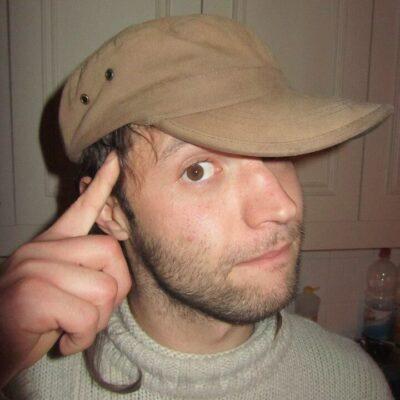We were up at dawn. Before the sun crested the ridge, we were packed and gone.
As agreed last evening, we stopped by Emilio’s hotel to have breakfast together. The place seemed forsaken. The open door led us past a vacant reception desk and a lobby in-the-works out to a backyard. A man was there, meditating over a running hose rather than watering the flowers. After we found a common language in Italian, he answered that they make no food, in a tone so bemused as if I’d asked him whether he sells exotic pets. I enquired about Emilio. He said he was sleeping upstairs and he could go wake him up, but we decided not to disturb and walked away unfed.
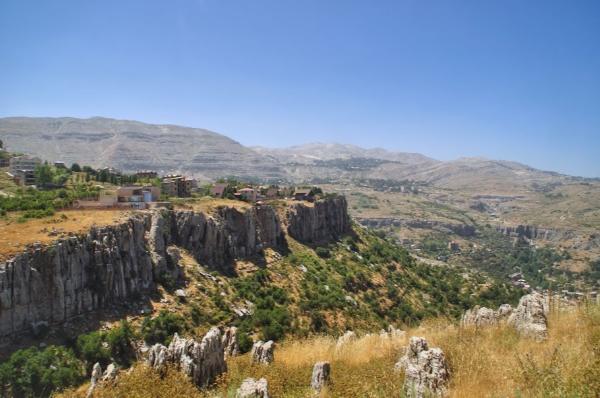
We had viands, but it’d be a hassle to unpack and prepare something. The town was of a certain size; there were plenty of restaurants marked on the map along the main road that our route followed.
Even though it was past 10 am, they were all shut and forlorn. Only at the last one, way out of the town, two men were present, one in construction workwear. I walked to them and, words failing, made a gesture for food. Consulting with each other for some seconds, they nodded yes with a hint of reluctance.
We sat in the beautiful lawned garden, in the shade of a massive cedar, and they brought us a QR code to an English menu. Upgrading the order to include lunch on top of breakfast, I walked to them again to place it. They couldn’t understand the items, either spoken in any European language or pointed to on the screen. In the end, they called someone who, still with great effort, interpreted over the phone. The working guy threw an apron over his paint-smudged boiler suit and made for the kitchen.
Glutted, we went back to striding in the cruel heat. A dirt road led us to a hamlet at the head of a secluded valley, where a few hovels with Christian sculptures by their doors lay scattered amid patchy farms. We sat on the berm under an apple tree for a few breaths. Two curious, adorable little boys, one carrying a pipe wrench as big as himself, joined us. Then we left civilization.
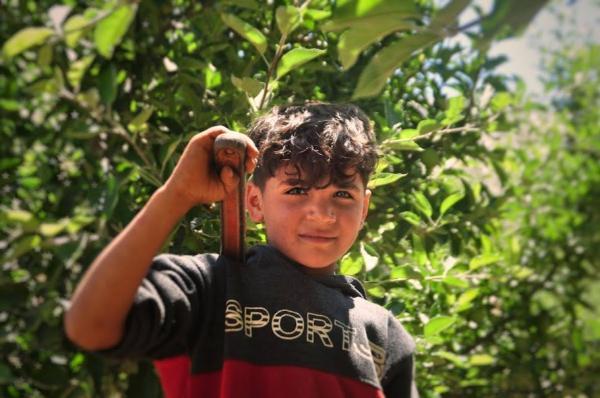
This story is an excerpt from my book "Backpacking Lebanon", wherein I recount my one-month journey around this fascinating country. Check it out if you like what you're reading.
Following an arduous, ambiguous path through dense thistles, we surmounted the pass above the hamlet and began descending the other side. A new, vast valley appeared below, filled with low-lying, billowing clouds, resembling a colossal bathtub shuffled in slow motion.
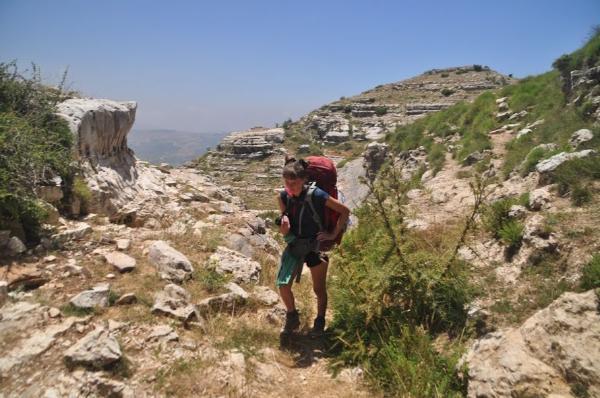
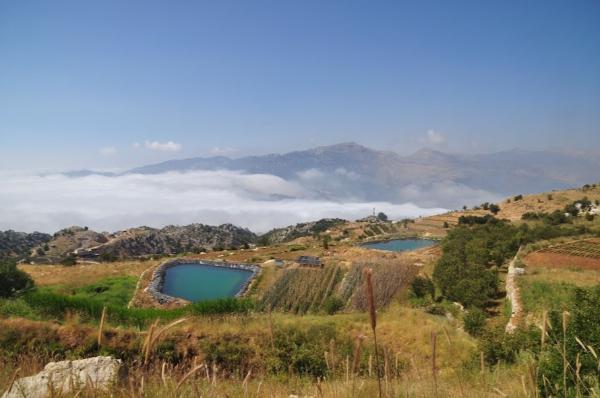
Sporadic houses, orchards, and irrigation ponds lay high up the slope, between us and the fog below, but no human was in view. We carried on east for hours along the mountain contour and only saw a lone shepherd—who was luckily around to restrain his vicious dogs just as they seemed about to maul us.
By evening, we took a steep path into a gorge and the village of Afqa that lay at its headwaters. This was the first and only Muslim village we encountered during our trek in the Lebanese mountains. Although diminutive, it is renowned for the impressive cave and waterfall to which it owes its existence and name (Aramaic for source). People have celebrated this natural wonder for numberless generations, ranging from ancient Greeks as the birthplace of their demigod Adonis to modern tourists as a scenic attraction.
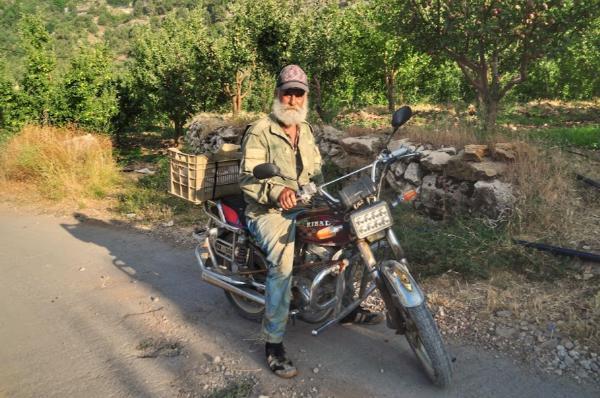
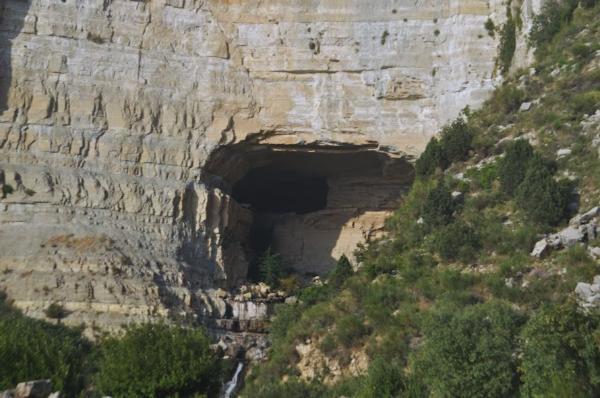
Despite the late hour, quite a crowd of native visitors was assembled before the cave. A restaurant also stood there, on a terrace constructed right above the final tier of the fall, on the rim of a 20-meter drop to the limpid pool at the base. We were starving and tired and low on supplies. So we walked in and occupied one of the few available tables.
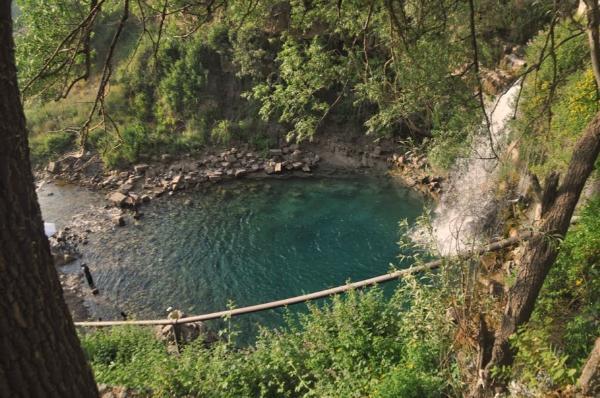
The waiter had a fine grasp of sale-pitching English. He proposed a barbecue meal at $20 per person. We bargained for a vegetarian meal at $20 in total. While we were dining, he popped by to offer a room for $50. After we declined, he shortly returned with a better price. We weren’t feeling rich enough for a room, however discounted, but level ground was scarce and it was dark already. Since he was so eager, I thought I’d ask him whether he’d lease a chuck of the terrace to put our tent on for… say… $5? He considered the idea but not a fee lower than $20. We thanked for the delectable dinner and, torches on, went out searching.
It turned out much easier than my daunted self had feared. The area before the cave was people-free now. We ruled to start with a look inside it. Up a flight of stairs, at the cave’s mouth, beside the bank of the gurgling, cavernous river, overlooking the jagged mountain silhouettes between the dimly lit village and the sparkling sky, we found a flat piece of ground that made for an idyllic camping spot.
Photos
View (and if you want use) all my photographs from Faraya and Afqa.
Accommodation and Activities in Lebanon
Affiliation disclosure: By purchasing goods or services via the links contained in this post, I may be earning a small commission from the seller's profit, without you being charged any extra penny. You will be thus greatly helping me to maintain and keep enriching this website. Thanks!
Stay22 is a handy tool that lets you search for and compare stays and experiences across multiple platforms on the same neat, interactive map. Hover over the listings to see the details. Click on the top-right settings icon to adjust your preferences; switch between hotels, experiences, or restaurants; and activate clever map overlays displaying information like transit lines or concentrations of sights. Click on the Show List button for the listings to appear in a list format. Booking via this map, I will be earning a small cut of the platform's profit without you being charged any extra penny. You will be thus greatly helping me to maintain and keep enriching this website. Thanks!
